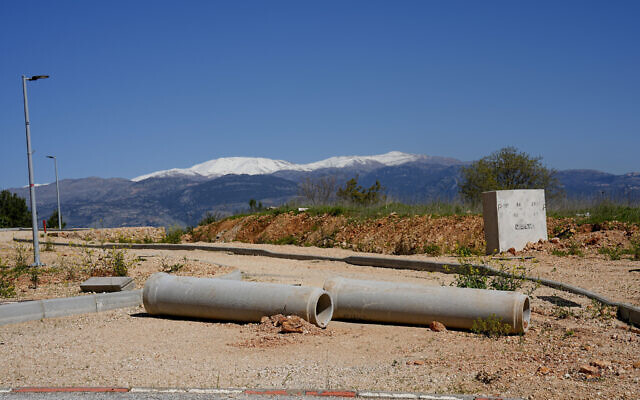Turkey’s ban on exports to Israel deals fresh blow to war-battered building industry
- Get link
- Other Apps
Turkey’s ban on some exports to Israel is poised to hit Israel’s construction industry hard at a time when the sector has already been badly damaged by the war with the Hamas terror group.
The imposed trade restrictions, mostly affecting goods upon which Israeli builders are dependent, will force importers to seek alternative suppliers from other countries, thereby incurring additional costs that will mean higher prices for consumers and businesses.
“It is a significant step by Turkey and a change in policy because until now, Turkey did not touch economic relations with Israel. Even during periods of high tensions on the political level, economic relations continued almost uninterrupted,” Gallia Lindenstrauss, a senior researcher at the Institute for National Security Studies (INSS), told The Times of Israel. “The action creates uncertainty in the business realm, which is never good for business relations.”
“There is a fear that there are other actors internationally that are silently boycotting Israel and that this is not only a bilateral crisis between countries but that it could also have ramifications on Israel’s trade relations in general,” Lindenstrauss cautioned.
Lindenstrauss noted that Israel and Turkey have free trade agreements since the mid-1990s that are now being violated. As the restrictions are affecting contracts between private entrepreneurs in Turkey and importers in Israel, there are likely to be economic and legal ramifications. Beyond Turkey, there is concern that the growing criticism over how the war in Gaza is being conducted will prompt other countries such as Norway or Ireland to follow suit with boycott actions.
Turkey this week announced export trade restrictions to Israel on 54 products including cement, steel, aluminum, iron construction materials and equipment in response to the war that has been raging in the Gaza Strip for more than six months.

Israel imports about 70 percent of iron construction materials and about a third of its cement needs from Turkey mainly for the use in the local construction and building industry, as well as sanitary products for bathrooms, according to the Israel Builders Association. Israel is also one of Turkey’s top steel destinations.
“Turkey is not the only producer of basic manufactured construction materials, but they are cheaper, also due to the geographical proximity,” said Shay Pauzner, deputy director general of the Israel Builders Association. “Now Israeli importers will need to look for alternative suppliers which will make the cost of construction even more expensive.”
“That’s as 40% of the construction sector is at a standstill since the outbreak of the war on October 7, grappling with a massive labor shortage due to the absence of Palestinian workers, which in turn is already causing a delay and slowdown in the building of housing needed to meet the shortage in supply in the real estate market,” Pauzner said.
Lindenstrauss similarly believes that although the sector will find substitutes, the expectation is that it will cause an increase in construction prices.
“Less so for households and more for larger infrastructure projects due to the disruptions,” she said.
The economic impact will not only be felt by consumers and businesses in the immediate term but also in the government coffers, as a large part of state revenue comes from real estate taxation, according to Pauzner.

Turkey, which openly supports Hamas and is one of the harshest critics of Israel during the Gaza war, in recent weeks accused Israel of failing to “allow adequate and uninterrupted flow of humanitarian aid into Gaza” and threatened that it would be taking measures after Israel rejected its request to take part in an aid airdrop for Gaza.
“The Turkish excuse or justification that Israel is not allowing airdrops doesn’t resonate well as Turkey is very high on the list of those providing humanitarian assistance to the Gaza Strip,” said Lindenstrauss.
Turkey and Israel normalized ties in 2022 by reappointing ambassadors after years of tensions. But those links quickly deteriorated after Hamas stormed into Israel on October 7, killing some 1,200 people and taking 253 hostages to Gaza, where about half of them remain.
Since the start of the war, more than 33,000 Palestinians have been killed, according to the Hamas-run Gaza health ministry. These figures can not be verified and do not differentiate between civilians and combatants. Israel says it has killed more than 13,000 gunmen in Gaza and another 1,000 terrorists inside Israel on October 7. As of Sunday, 260 IDF soldiers have been killed during fighting in Gaza.
Turkey said that the trade sanctions will remain in place unless Israel declares a ceasefire immediately. Meanwhile, Israel buys more from Turkey than it sells to the Islamic country, which could mean that Turkey’s economy could take a bigger hit than Israel from its own actions. Turkey is Israel’s fifth-largest source of imported goods and Israel’s 10th-largest export market, according to data by the Central Bureau of Statistics.
However, even before the outbreak of the Gaza war, trade with Turkey started to decline. Last year, Turkey’s exports to Israel amounted to $5.4 billion, down from $7.03 billion in 2022, according to data by Turkey’s Trade Ministry. That’s after export volume more than doubled over the previous decade, despite the long-strained diplomatic ties between the two countries. From Israel, Turkey buys chemicals, metals, and other industrial products that are part of its plastic and paint industries.
“We already saw a decrease in trade levels of about 30% in 2023, compared to 2022, including a decline in the exports of construction materials to Israel probably due to a slowdown in the Israeli economy and the uncertainty caused by the political instability which also impacted the building sector,” said Lindenstrauss.
Prof. Ilan Alon, dean of the School of Economics at the College of Management, reckoned that although prices are likely to increase, overall the economy is going to be resilient enough to deal with any kind of Turkish embargo.
“However, as a country we do have to think about what it is that we want to manufacture inside Israel, what it is we could live with and what it is we could live without, and what are the costs that we are willing to take as consumers,” Alon said.
Dafna Kaplansky, head of foreign trade at the Manufacturers Association of Israel, said Turkey’s boycott action exemplifies why it is essential for Israel to reduce its dependence on imports.
“It is very important in routine times and even more during a state of emergency for Israel to have a strong and independent local manufacturing industry,” said Kaplansky. “We see what is happening as a testcase for the Israeli public and Israeli decisionmakers to take the necessary steps to give more power to the Israeli industry by buying Israeli products over the cheaper alternative in public tenders and giving priority to local factories.”
Israel has one local cement factory that could produce more if there were more demand, she suggested.
In response to the unilateral step by Turkey to restrict exports, Israel’s Foreign Minister Israel Katz said that the government was working on an “extended list of additional products that Israel will prevent Turkey from exporting” to the country. Israel said it will appeal to pro-Israel countries and organizations to curtail investments in Turkey and prevent the import of Turkish products.
“The question of how to react to Turkey’s action is not only discussed with regard to Israel’s relationship vis-a-vis Turkish exports, but the issue is, how will Israel’s response look so other countries will not follow Turkey’s lead,” Lindenstrauss noted.

Facing domestic political pressure, Ireland’s sovereign investment fund, earlier this month announced that it will pull investments from Israel’s largest banks and a supermarket chain over their activities in the West Bank and East Jerusalem.
McDonald’s Corp. said it will buy up Alonyal, the owner of 225 McDonald’s restaurants in Israel, which have been hit by calls for a boycott over the war with Hamas in Gaza. The boycott calls, which the fast-food chain said have hurt sales, were set off after the franchised restaurants in Israel offered thousands of free meals to Israeli soldiers.
“The longer the war continues and the civilian casualties in Gaza mount, the more difficult it would be for Israel to stand alone, economically, politically, and diplomatically, but Israel should not stand silent against all these attacks,” said Alon. “We need to make it clear to other countries that if they hurt Israel, there will be consequences that harm their economy.”




Comments
Post a Comment